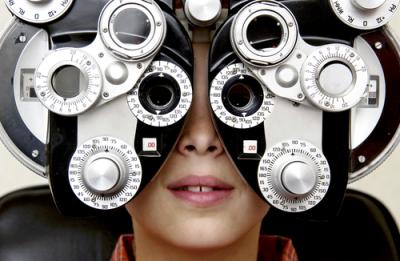LASIK Eye Surgery and Astigmatism
January 23rd, 2017

Most people associate LASIK eye surgery as a treatment for farsightedness and nearsightedness. What they don’t realize is that it is also a treatment option for astigmatism.
But what is it about astigmatism that makes it correctable by LASIK?
Astigmatism is a common vision problem that occurs when the cornea is shaped more like an egg rather than a ball. This affects the normal path of light through the eye, which can cause the vision to blur regardless of whether a person is trying to see close or far away.
Most people with astigmatism tend to squint when they are trying to see details. They do this because they are attempting to improve focus, but this can be the cause of intense headaches. Squinting can also be an aggravation for the person doing the squinting and anyone around him or her.
How LASIK Improves Astigmatism
When astigmatism is corrected with eyeglasses or contacts, the purpose is to redirect light so it travels through the cornea correctly. Without this correction, the egg-shaped cornea causes light to pass through incorrectly, which causes the blurred vision. With correction, a person can have a sharper focus. Sharper focus also means fewer headaches.
It is possible for a person with another vision issue, such as nearsightedness, to have astigmatism, which is why correction tends to be integrated into eyeglasses and contacts. A person with corrective lenses for nearsightedness can still experience blurred vision if the astigmatism isn’t corrected.
When astigmatism is improved with lasers, the shape of the cornea is adjusted to allow the eye to process light the way a round eye should. This makes the blurred vision go away.
An Option for You?
Individuals throughout Huntsville and Decatur, Alabama, have had LASIK for astigmatism performed and seen great results. Whether this type of surgery is an option for you depends on the severity of astigmatism and the type. Other health issues and your lifestyle may also affect the ability to have LASIK for astigmatism.
Even if you think that you are not a candidate because your vision problem isn’t severe enough, visual acuity isn’t necessarily a way to measure if a person is a candidate for LASIK. It comes down to refractive error and if it is within the range of treatment. If you have a refractive error of up to -3.0 diopters or -9.0 diopters with astigmatism and nearsightedness, then you may be a candidate.
How much your eyes have changed between annual eye exams can play a role as well. For instance, your doctor may not want to see a change of more than 0.5 diopters in the year before the pre-op exam.
The only way you will truly know if you are a candidate is to have your eyes examined by experienced doctors. You also want a LASIK surgeon with a good success record in astigmatism correction using LASIK. You will be walked through the different options, the technology that is used, preparation, and what to expect. You will also receive answers to your questions.
If you would like more information on LASIK surgery and astigmatism, be sure to contact Dr. Danny Lee‘s offices in Huntsville, AL!


